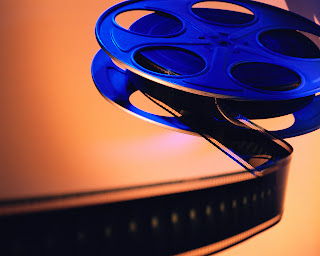A month ago, I had the opportunity to work on the film set for "Writers' Block". While this post may be a little belated, I wanted to share a few random, interesting things about filmmaking I learned while on set, for those who are curious for a few "insider" nuggets.
Lesson #1: On a low-budget, short-schedule production (like "Writers' Block", shot in two weeks in under $20,000), it takes about one hour to film every minute of the movie (or, every page of the script). On the other hand, on a big-budget production with many millions of dollars, filmmakers will film about half a page a day; a page is pushing it. Can you imagine that? That means that for every thirty to sixty seconds you watch on a movie, the filmmakers spent hours and hours filming it! This allows the wealthy filmmaker to make every shot "perfect".
Lesson #2: Low-budget movie trick: You can make a room look like it's nighttime in the middle of the day... with a trash bag. Tape a black trash bag over the window, throw in a light that resembles moonlight, and there you have it: a convincing nighttime effect.
Lesson #3: The difference between normal makeup and movie makeup: Movie makeup is thicker, ideally easy to apply on set, and usually has a slight yellowish tint. (The yellow tint has a better appearance on camera.)
Lesson #4: Filmmakers almost have their own language. It seems like they have an acronym or nickname for everything. For example:
- MOS: Stands for "Minus Optical Sound". Meaning: If a shot is filmed "MOS", that means they're not recording sound for this shot. (Implications: The crew is allowed to breath for a few seconds, and the craft services back stage can quickly wash a few dishes and chop a few turkey wraps until the next shot begins, preceded by: "QUIET ON THE SET!!!")
- Talent: Actors and actresses are referred to as "talent". I'm not exactly sure why, but the term "talent" is used more often than "cast" or "actor/actress".
- BTS: Stands for "behind the scenes". I'm not sure if I ever heard someone on set say "behind the scenes"; it was always "BTS". It seems everything becomes an acronym in film culture; "1st AD", "2nd AD", "PA", "PO", and many more. It takes a while to learn what all the acronyms mean. (The four above are, respectively: First Assistant Director, Second Assistant Director, Production Assistant, and Production Office.)
Lesson #5: I found it surprising how many "technical" things go into every shot. What I mean is that the director has so much more to be concerned about than simply what the audience will see; such as, the way the actors speak a line or perform an action, or the lighting, or the framing. So much of the discussions had before every shot involve things that the audience will never see.
For an example, the script supervisor is communicating with the sound guy, and with the camera assistant doing slates, to make sure they're all on the same page with which scene, shot, and take they're on. "This is twenty-two charlie, take two?" "No, this is twenty-two charlie, take three." The script supervisor writes this down, and sound guy puts this in his records, and the camera assistant writes it on the slate. None of these things effect the audience, but they are vital during post-production (editing, etc.).
There are many other important technical things that the crew needs to discuss; is video village working? How should the sound/light equipment be best arranged, to allow room for important crew to stand by and watch? How's the temperature of the room; is the equipment getting too hot? All these things are very important and time-consuming; and yet, most of their results never impact the finished movie.
Lesson #6: Last but not least: When on a set, always bring clothespins for weapons. You'll find out why soon enough. :-)

